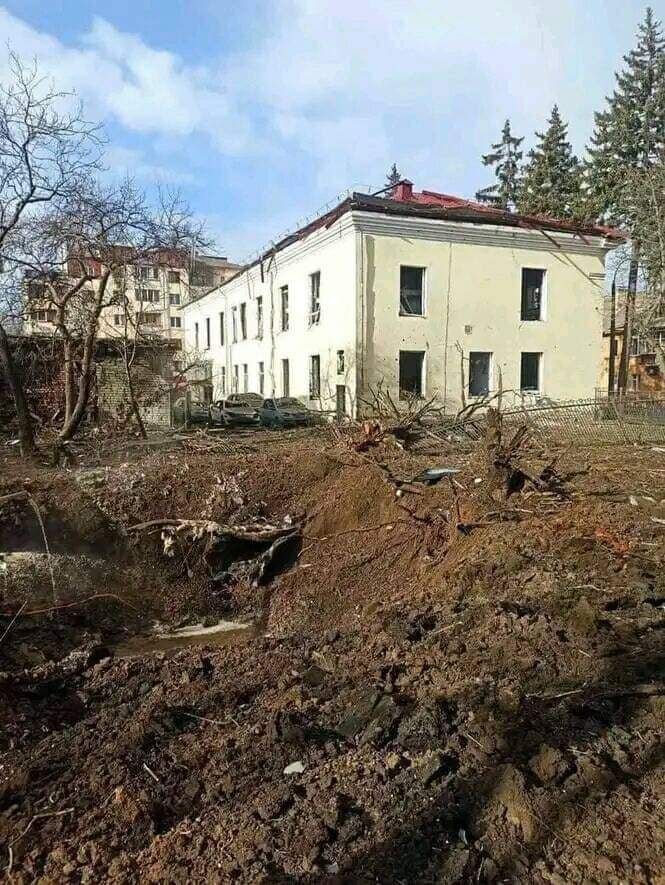Stéphane Goldstein from the Information Literacy Group has written this post on media and information literacy in Ukraine.

A few days ago, CILIP issued a statement of solidarity with librarians, archivists and information professionals in Ukraine[1], signed (at time of writing) by nearly 700 of their peers in the UK and beyond. The statement declares that “the library, archive and information professional community in the UK will work with our colleagues around the world to offer whatever support and solidarity we can to our professional colleagues in Ukraine”.
It is timely remind ourselves that media and information literacy has been a highly pertinent issue in Ukraine these past few years. Russian bombs and missiles are raining indiscriminately on Ukrainian cities and towns right now, but we should not forget that Ukraine has long been the subject of vicious disinformation campaigns from its powerful neighbour. It’s not surprising that the country has paid attention to ways of defending itself in the informational aspects of what has been a hybrid war at least since the 2014 conflict[2]. One prime example of building the necessary resilience is the Learn to Discern in Education[3] (L2D-Ed) programme piloted by IREX, not-for-profit education organisation with international reach. Since 2015, L2D-Ed has worked with the Ukrainian Ministry of Education and Science to integrate critical information consumption skills into existing secondary school curricula and teacher training programmes. The programme has produced noticeably positive and documented outcomes[4]. Another more recent instance was during Global Media and Information Literacy Week in October 2021 when UNICEF, the United Nations Children and Education Fund, promoted its media literacy schools resources[5] in Ukrainian, with lessons material drawing from popular YouTube videos that help to refute disinformation and myths about Covid-19 and vaccination.
Outside the realm of schools, a current project[6], funded by the US Department of State and the Estonian Department of Foreign Affairs, aims notably to develop critical thinking and media literacy among local journalists and communities in Western Ukraine. The work was due to be completed at the end of 2022, but given current events, its status is unclear.
These are just a few examples, although such approaches, however successful, remain relatively limited in scope. But they reflect increasing awareness of the need to act at the national level . At a conference in March 2021, Volodymyr Zelensky, the now-embattled President of Ukraine, declared that “media literacy lessons should appear in our school curriculum. We should also teach those who finished school long ago – our parents, our grandparents – what information hygiene is, what fakes are, what propaganda is, and how someone, in just a few sentences or even words, can control their minds and their hearts”[7]. By then, media literacy had already become established in Ukrainian secondary schools – although rather less so in the primary sector. In 2016, a report[8] on the implementation of media literacy courses stressed that independent critical thinking development was a priority of media education (media education is taken to include media literacy). The report pointed to some progress, including the integration of media education in different school subjects, but with scope for improvement in areas such as administrative support and the distribution of educational material.
For now, of course, the tragic events stemming from the Russian invasion mean that all relevant initiatives are severely disrupted. In the words of Valeri Kovtun, who advises the Ukrainian government on media literacy, “on February 23, the day before the war, we held a strategic session at the ministry, planning media literacy policy for the next 5 years. On February 23, I did not know that in 12 hours my country would be attacked by a psycho with a big ego”[9]. And even in a time of severe crisis, Ukrainians have learnt some valuable lessons about the combatting of disinformation, as witnessed by prebuttal efforts in anticipation of an expected Russian information and psychological offensive[10]. More generally, and as reported by the Washington Post’s Drew Harwell[11], Ukrainians are proving to be very information-savvy in their deployment of social media to counter both physical and informational aggression.
This post is no more than a very brief snapshot and the situation in Ukraine will have doubtless evolved by the time the text is published. But whatever transpires in the coming days, there should be no doubt about the will to set Ukraine on a path towards information and media literacy.
[1] CILIP, ‘Statement of solidarity with librarians, archivists and information professionals in Ukraine’ – https://www.cilip.org.uk/news/news.asp?id=597028
[2] De Andrade Gama I, Mozgin W, ‘Media Literacy and its Role in Countering Hybrid Warfare (the Case of Ukraine)’, Future Human Image 2021; 15: 4-13 – https://www.ceeol.com/search/article-detail?id=990107
[3] IREX, ‘Strengthening media literacy in the Ukrainian education system’ – https://www.irex.org/project/strengthening-media-literacy-ukrainian-education-system
[4] Haigh M, Haigh T, Matychak T, ‘Information Literacy vs. Fake News: The Case of Ukraine’, Open Information Science 2019; 3: 154–165 – https://doi.org/10.1515/opis-2019-0011
[5] UNICEF, ‘UNICEF invites schools to join an all-Ukrainian media literacy lesson’ – https://www.unicef.org/ukraine/en/node/4631
[6] Estonian Centre for International Development, ‘Project: Enhancing societal resilience through strengthening local media and developing media literacy in Western Ukraine’ – https://eceap.eu/project/project-enhancing-societal-resilience-through-strengthening-local-media-and-developing-media-literacy-in-western-ukraine/
[7] Ukrinform, ‘ Zelensky: Media literacy lessons should be introduced in schools’, 09/03/2021 – https://www.ukrinform.net/rubric-polytics/3204538-zelensky-media-literacy-lessons-should-be-introduced-in-schools.html
[8] Internews Network, ‘Implementation of media education and media literacy sources in secondary schools in Ukraine’, June 2016 – https://www.slideshare.net/umedia/media-education-in-ukrainian-schools-analitycal-report-english-translation-2016
[9] Valerie Kovtun @valerie_kov, on Twitter, 27/02/2022 – https://twitter.com/valerie_kov/status/1497927335831650310
[10] Reznikov Oleksii, on Facebook, 01/03/2022 – https://www.facebook.com/reznikovoleksii/posts/358318209637870
[11] Drew Harwell @drewharwell, on Twitter, 01/03/2022 – https://twitter.com/drewharwell/status/1498650426287210501




Thank you. The situation with media literacy in Ukraine is not great at the moment especially since the new law introduced on 18/03/22 having just 1 TV channel during the war.